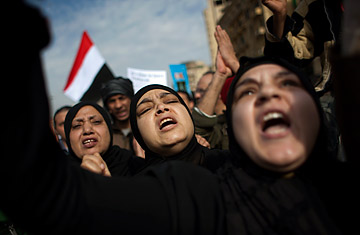
Egyptian protesters shout slogans as they march toward Tahrir Square in Cairo, Feb. 1, 2011
When popular demonstrations broke out on Jan. 25 against the U.S.-backed regime of Egyptian President Hosni Mubarak, more than 50,000 Americans were in Egypt, many of them visiting the pyramids during what is normally the beginning of the high tourist season. The U.S. government is now advising its citizens to stay in their hotels and away from the protests. An American government jet airliner, emblazoned with the seal of the U.S., sat on the tarmac of Cairo International Airport waiting to evacuate families of American diplomats when I arrived on Monday. The scene called to mind the Iranian revolution of 1979, when, after the fall of the Shah, another American-backed dictator, radicals stormed the U.S. embassy in Tehran. As if to prevent such a scenario in Egypt now, an American-designed Abrams Egyptian army tank stands guard at the entrance of the American embassy in downtown Cairo, which just happens to be a couple of blocks from the epicenter of the protests in Tahrir Square.
But this is not 1979. American flags aren't being burned in the streets of Cairo. And it's too bad more American college students on class trips stuck in Egypt haven't attended the demonstrations. Not only are protesters unfailingly polite toward American visitors, but, by calling for an end to the Mubarak regime, Egypt's popular uprising could actually be the beginning of a better friendship between the U.S. and Egypt.
Though the U.S.-brokered Camp David peace agreement of 1979 between Israel and Egypt is one of the foundations of American policy in the Middle East, the relationship between Egypt and America long ago became dysfunctional. In return for Egypt's continuing support of U.S. efforts to safeguard the Jewish state, the U.S. gives Egypt billions of dollars in aid, and turns a blind eye to the Mubarak regime's autocratic policies. But the regime's despotic tactics and its pro-American policies have become more and more unpopular as Palestinian-Israeli peace — the ultimate promise of Camp David — never materialized. The U.S. has long worried that the inevitable breakup in Egypt would be ugly, and that Mubarak's replacement might be the Muslim Brotherhood, Egypt's largest opposition party, which has ties to the anti-Israeli Palestinian militant group Hamas.
But the fact that the Mubarak regime is being pushed aside by a broad-based people-power movement could be an opportunity for the U.S. to re-establish the relationship on a more sustainable basis. The Egyptian people have not risen up against their ruler to realign the country with the anti-American, anti-Israeli axis of Iran, Hamas, Syria and Hizballah in the cold war for the Middle East. Of the legion of signs and slogans arrayed and shouted in Tahrir Square, I encountered just one that even referred to Israel: a small Star of David on the necktie of a Mubarak dummy hung in effigy from a lamppost. For a political demonstration in the Arab world, this is next to nothing. One protester ran up to me and said, "I want the American people to know this is not about Israel. We are at peace with Israel. We are not at peace with Mubarak."
In fact, Egyptians have taken to the streets because they want to be citizens of a normal, modern country that's proud of itself and its place in the world, that chooses its leaders and its foreign policies, not a vassal state collecting handouts while its standard of living and moral values disappear. Which means that although a new government in Egypt would probably stop coordinating security policy with Israel, and would be more forceful in pursuing the Palestinian cause, it would not want war. "Camp David is a fact not just in Egypt but all the Middle East," says Nagui El Ghatrifi, a former top Foreign Ministry official in the Egyptian government who became an opposition party leader in 2004, whom I met Tuesday after he finished praying with a large group of men at the demonstration in Tahrir Square. "Look at the Middle East. Only the most tyrannical regimes adhere to the old dealings with Israel. But that doesn't mean that the Egyptian people are prepared to accept injustice in Palestine or at home."
Continuing to look at events in Egypt only through the lens of foreign policy would be a big mistake. "If the U.S. realizes that there is a difference between an oppressed people and a people who managed to remove a tyrant, then it will remove many of the barriers between the two countries," El Ghatrifi continues. "An Egypt without Mubarak will be more stable, more democratic and more peaceful in solving internal problems and dealing with its foreign policy."
